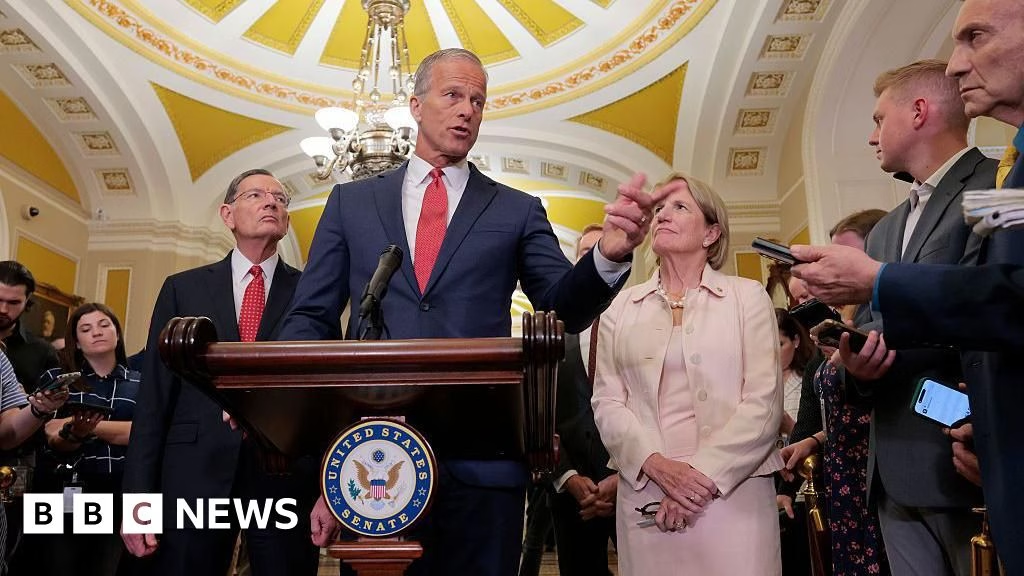The US Senate is currently engaged in a prolonged voting process regarding a significant budget bill that is crucial to President Donald Trump’s agenda. However, the bill’s fate is uncertain after weeks of intense negotiations between political parties.
Republicans, who hold the majority in both congressional chambers, are divided on the extent of cuts to welfare programs. The aim is to balance these reductions with the extension of tax breaks, as outlined in the “One Big Beautiful Bill Act.”
The goal is to pass the legislation before the Fourth of July holiday, a deadline set by the president’s party. If the Senate approves the bill, it must then return to the House of Representatives for another vote. The House had previously passed its version of the bill by a slim margin.
During the voting process, known as “vote-a-rama,” senators are debating potential amendments to the nearly 1,000-page bill. This process could involve up to 20 hours of debate, extending into Tuesday.
Senate Majority Leader John Thune acknowledged on Monday that there were still details to be finalized.
One controversial amendment proposed by Florida Senator Rick Scott could lead to approximately 20 million Americans losing their health insurance coverage. Thune responded to this concern by noting that the proposed cuts would not take effect until 2031.
Democrats, who have voiced strong opposition to the bill, especially with regard to health insurance cuts, are expected to utilize all of their allocated debate time. Senator Adam Schiff called the bill “terrible” and expressed doubts about meeting the president’s deadline.
Meanwhile, Republican Senator John Fetterman expressed frustration, stating that the extended negotiations and voting have caused him to miss his planned beach vacation. He also questioned the utility of keeping senators at the Capitol until late hours.
To stall the bill’s progress, Democrats utilized a political maneuver, requiring Senate clerks to read all 940 pages of the bill aloud. This took 16 hours and followed weeks of discussions and a tight 51-49 vote.
Two Republicans joined Democrats in voting against opening debate, arguing for further changes to the legislation. Senator Thom Tillis of North Carolina retired following the vote and criticized the bill for failing to uphold campaign promises made by Trump and the Republican party.
The White House dismissed Tillis’s comments, with Press Secretary Karoline Leavitt defending the bill. Another Republican, Senator Rand Paul of Kentucky, objected to the bill’s provisions on debt and Medicaid cuts.
It is anticipated that Republicans can afford no more than three defections for the bill to pass. Should they lose three votes, Vice-President JD Vance would have to cast the deciding vote.
After the Senate vote, the bill would return to the House, where Republicans could also afford to lose only a limited number of votes. Concerns among some House Republicans about the Senate version remained, potentially indicating another close vote.
The House Freedom Caucus expressed opposition to the Senate version over budget issues, arguing that it would not be fiscally responsible. They criticized the bill for adding $650 billion to the national deficit.
Democrats in both chambers have generally opposed the proposed cuts and the extension of tax breaks.
The bill includes tax cuts that Trump campaigned on, such as a deduction on Social Security benefits and the elimination of taxes on overtime work and tips. It also authorizes $5 trillion in new borrowing, which has annoyed conservatives and prompted Elon Musk to announce the formation of a new political party if the bill is passed. Musk vowed to fund challengers to any conservative who supports the bill, arguing that the country needs an alternative to the existing political parties.
The national debt stands at $36 trillion, and Treasury Secretary Scott Bessent has warned that Congress must address the debt limit by mid-July to prevent the US from becoming unable to pay its bills, potentially as early as August.
Source: https://www.bbc.com/news/articles/czjkkdyplymo








